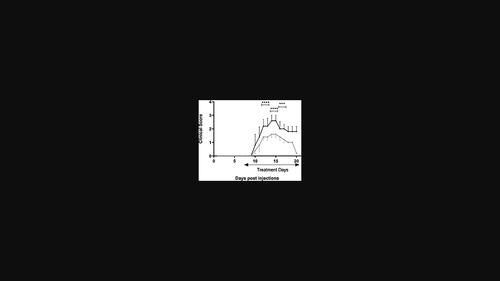当前位置:
X-MOL 学术
›
Pept. Sci.
›
论文详情
Our official English website, www.x-mol.net, welcomes your feedback! (Note: you will need to create a separate account there.)
Application of a triple-helical peptide inhibitor of MMP-2/MMP-9 to examine T-cell activation in experimental autoimmune encephalomyelitis
Peptide Science ( IF 1.5 ) Pub Date : 2022-03-07 , DOI: 10.1002/pep2.24262 Lillian Onwuha‐Ekpete 1 , Gregg B. Fields 1, 2
Peptide Science ( IF 1.5 ) Pub Date : 2022-03-07 , DOI: 10.1002/pep2.24262 Lillian Onwuha‐Ekpete 1 , Gregg B. Fields 1, 2
Affiliation

|
Multiple sclerosis (MS) is an inflammatory demyelinating disease whereby pathology includes multifocal perivascular mononuclear cell infiltration into the central nervous system, oligodendrocyte loss and demyelination, and variable axonal loss. Little is known about the causative agent in MS, but the matrix metalloproteinase (MMP) family of proteolytic enzymes has been implicated in disease progression and resolution. Recent studies revealed that MMP-2 and/or MMP-9 are required for an effective T-cell-mediated immune response to antigenic stimulation. In the present studies, we used an MMP-2/MMP-9 selective triple-helical peptide inhibitor (THPI) to examine the role of these enzymes in antigen specific T-cell responses. We found that treatment of murine CD4+ T-cells with the THPI, followed by CD3/CD28 stimulation of the T-cell receptor (TCR), resulted in reduced cell proliferation and production of interleukin 2 (IL-2), interferon gamma (IFN-γ), and tumor-necrosis factor alpha (TNF-α). Application of the THPI in experimental autoimmune encephalomyelitis (EAE), a widely accepted animal model of MS, reduced clinical severity of the disease and weight loss. Splenocytes isolated from THPI-treated EAE animals had reduced proliferation compared with untreated animals. In an in vitro recall experiment, splenocytes isolated from EAE mice were treated with the THPI, followed by CD3/CD28 stimulation of the TCR. Treated splenocytes had reduced production of IL-2, IL-6, IL-10, IFN-γ, and TNF-α compared with untreated splenocytes isolated from EAE mice. Overall, the MMP-2/MMP-9-targeting THPI modulates T-cell response to antigenic stimulation, including proliferation and immune cell production of specific cytokines, providing insight as to why the THPI is effective in reducing the clinical severity of EAE.
中文翻译:

应用 MMP-2/MMP-9 三螺旋肽抑制剂检测实验性自身免疫性脑脊髓炎中的 T 细胞活化
多发性硬化症 (MS) 是一种炎症性脱髓鞘疾病,其病理学包括多灶性血管周围单核细胞浸润到中枢神经系统、少突胶质细胞丢失和脱髓鞘以及可变的轴突丢失。对 MS 的病原体知之甚少,但蛋白水解酶的基质金属蛋白酶 (MMP) 家族与疾病进展和消退有关。最近的研究表明,对抗原刺激产生有效的 T 细胞介导的免疫反应需要 MMP-2 和/或 MMP-9。在本研究中,我们使用 MMP-2/MMP-9 选择性三螺旋肽抑制剂 (THPI) 来检查这些酶在抗原特异性 T 细胞反应中的作用。我们发现用 THPI 处理鼠 CD4+ T 细胞,然后用 CD3/CD28 刺激 T 细胞受体 (TCR),导致细胞增殖和白细胞介素 2 (IL-2)、干扰素 γ (IFN-γ) 和肿瘤坏死因子 α (TNF-α) 的产生减少。THPI 在实验性自身免疫性脑脊髓炎 (EAE) 中的应用,这是一种广泛接受的 MS 动物模型,可降低疾病的临床严重程度和体重减轻。与未处理的动物相比,从 THPI 处理的 EAE 动物分离的脾细胞增殖减少。在一个在体外回忆实验中,从 EAE 小鼠中分离出的脾细胞用 THPI 处理,然后用 CD3/CD28 刺激 TCR。与从 EAE 小鼠分离的未经处理的脾细胞相比,经处理的脾细胞减少了 IL-2、IL-6、IL-10、IFN-γ 和 TNF-α 的产生。总体而言,靶向 MMP-2/MMP-9 的 THPI 可调节 T 细胞对抗原刺激的反应,包括特定细胞因子的增殖和免疫细胞产生,从而深入了解为何 THPI 可有效降低 EAE 的临床严重程度。
更新日期:2022-03-07
中文翻译:

应用 MMP-2/MMP-9 三螺旋肽抑制剂检测实验性自身免疫性脑脊髓炎中的 T 细胞活化
多发性硬化症 (MS) 是一种炎症性脱髓鞘疾病,其病理学包括多灶性血管周围单核细胞浸润到中枢神经系统、少突胶质细胞丢失和脱髓鞘以及可变的轴突丢失。对 MS 的病原体知之甚少,但蛋白水解酶的基质金属蛋白酶 (MMP) 家族与疾病进展和消退有关。最近的研究表明,对抗原刺激产生有效的 T 细胞介导的免疫反应需要 MMP-2 和/或 MMP-9。在本研究中,我们使用 MMP-2/MMP-9 选择性三螺旋肽抑制剂 (THPI) 来检查这些酶在抗原特异性 T 细胞反应中的作用。我们发现用 THPI 处理鼠 CD4+ T 细胞,然后用 CD3/CD28 刺激 T 细胞受体 (TCR),导致细胞增殖和白细胞介素 2 (IL-2)、干扰素 γ (IFN-γ) 和肿瘤坏死因子 α (TNF-α) 的产生减少。THPI 在实验性自身免疫性脑脊髓炎 (EAE) 中的应用,这是一种广泛接受的 MS 动物模型,可降低疾病的临床严重程度和体重减轻。与未处理的动物相比,从 THPI 处理的 EAE 动物分离的脾细胞增殖减少。在一个在体外回忆实验中,从 EAE 小鼠中分离出的脾细胞用 THPI 处理,然后用 CD3/CD28 刺激 TCR。与从 EAE 小鼠分离的未经处理的脾细胞相比,经处理的脾细胞减少了 IL-2、IL-6、IL-10、IFN-γ 和 TNF-α 的产生。总体而言,靶向 MMP-2/MMP-9 的 THPI 可调节 T 细胞对抗原刺激的反应,包括特定细胞因子的增殖和免疫细胞产生,从而深入了解为何 THPI 可有效降低 EAE 的临床严重程度。








































 京公网安备 11010802027423号
京公网安备 11010802027423号